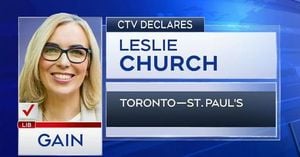Netflix's announcement of its reboot of the iconic series Little House on the Prairie has ignited significant controversy, pitting former cast member Melissa Gilbert against conservative pundit Megyn Kelly over concerns of ideological reinterpretation.
On January 29, 2024, Netflix confirmed the development of the reimagining of the beloved show, which originally aired from 1974 to 1983. The reboot promises to be part family drama, part survival epic, and part origin story of the American West, aiming to bring the stories of Laura Ingalls Wilder’s youth to a contemporary audience. Yet, the announcement faced immediate backlash, particularly from Kelly, who threatened to "ruin" the project if it embraced what she referred to as 'woke' themes.
"If you wokeify Little House on the Prairie, I will make it my singular mission to absolutely ruin your project," Kelly remarked on X, sparking outrage and rebuttals from fans and former stars alike.
Gilbert, who portrayed Laura Ingalls Wilder on the original series, did not hold back. On January 30, she responded firmly to Kelly's comments via social media. "Apparently Megyn tweeted (I’m not on [X]) asking Netflix not 'woke-ify' their Little House remake. Umm…watch the original again. TV doesn't get too much more 'woke' than we did," Gilbert stated, referencing the show's history of exploring sensitive issues.
Stressing the progressive themes of the original, she pointedly listed topics the series tackled: "racism, addiction, nativism, antisemitism, misogyny, rape, spousal abuse and every other 'woke' topic you can think of." With her experience both as an actress and as someone who previously engaged with politically charged discussions—having served as president of the Screen Actors Guild—Gilbert’s defense reflects her commitment to the legacy of the show.
Netflix is presenting the reboot as a fresh take on Wilder's nostalgic yet complex narratives. Jinny Howe, Netflix's Vice President of Drama Series, expressed optimism about the project, saying, "Little House on the Prairie has captured the hearts and imaginations of so many fans around the world... we’re excited to share its enduring themes of hope and optimism with a fresh take on this iconic story." Howe's remarks suggest the aim is to recontextualize the narrative for modern viewers without losing sight of its roots.
Rebecca Sonnenshine, who will serve as showrunner and has previously worked on series like The Boys and The Vampire Diaries, echoed this sentiment, sharing her passion for the source material. "I fell deeply in love with these books when I was 5 years old. They inspired me to become a writer and filmmaker, and I am honoured and thrilled to be adapting these stories for a new audience." Her acknowledgment of the original's impact on her career highlights the transformative power of Wilder's storytelling.
The announcement of the reboot has not only reignited interest in the original series but has also brought attention to the culture wars surrounding storytelling and representation. While Kelly's criticisms reflect broader conservative concerns over perceived 'wokeness' infiltrated what they view as traditional narratives, Gilbert's counterpoint emphasizes the need to acknowledge the historical relevance of both the original and the stories it portrayed.
Part of the intrigue lies not only in what the reboot intends to showcase but also how it reflects contemporary societal issues. Gilbert has noted the enduring relevance of the themes from the original series, stating, "The conservative movement considers ‘Little House on the Prairie’ their show. And there’s the liberal movement as well ... which unfortunately are the stories today about women's rights and voting rights." This dual ownership bears witness to the timelessness of Wilder’s stories and the debates they may still stir today.
Though the exact premiere date for the reboot remains unannounced, anticipation is building as audiences gear up for what promises to be another chapter of life on the American prairie. The controversy sparked by Kelly's remarks could very well serve as fuel for renewed interest, prompting viewers both old and new to engage with the legacy of Little House on the Prairie. Fans are hopeful for a series steeped less in the politics of the present and more focused on the simple yet compelling struggles of frontier life. After all, the original series has traditionally been seen as comforting television—one which offered lessons about resilience and family overcoming hardships.
Only time will reveal if Netflix’s refreshed endeavor manages to evoke the same warmth and affection as its predecessor, or if it will become yet another battleground for cultural clash.



